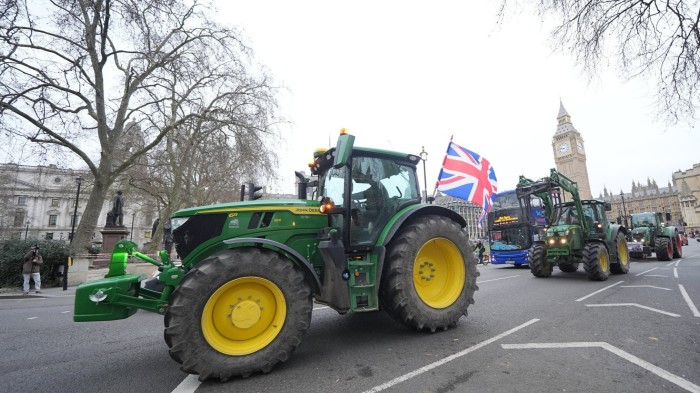Unlock the Editor’s Digest for free
Roula Khalaf, Editor of the FT, selects her favourite stories in this weekly newsletter.
Hundreds of tractors gathered on Whitehall on Wednesday morning in the latest protest by UK farmers against changes to tax reliefs announced by Rachel Reeves in the Budget, which they say will spell the death of their sector.
Farmers from across the country drove to central London to join the rally under the banner “RIP British Farming”, the most recent in a string of demonstrations by the industry, which says it is already buckling under the strains of climate change, withdrawal of subsidies and post-Brexit trade deals.
The protest took place as MPs on the House of Commons environment, food and rural affairs committee heard evidence from tax experts and farming group leaders about the impact of the proposed changes to inheritance tax reliefs on the farming and wider rural community.
Under reforms to agricultural property and business property relief set out by the chancellor, farmers will be liable to pay a tax rate of 20 per cent on inherited agricultural and business assets valued at more than £1mn, which were previously exempt. The changes will apply from April 2026.
“Since the announcement in the Budget about the changes to agricultural property relief, there has been an enormous amount of concern amongst the farming community that the viability and future of their farms are at risk,” said Alistair Carmichael, Liberal Democrat MP and chair of the Commons committee, ahead of the hearing.
The National Farmers’ Union, along with other farming groups, has been pushing for concessions and changes to the reforms, but the government is standing firm.
Since the announcement, different groups had disputed the number of farms that would be affected, Carmichael said, adding that he hoped the evidence session would “shed some light on the predicted figures”.
Ministers and farmers have failed to agree on how many farms will be affected by the changes since October. The Treasury estimated 73 per cent of previous claims for agricultural property relief fell below £1mn, concluding that the vast majority of farms would be unaffected by the new threshold.
However, the NFU, the UK’s largest farming group, has pointed to official farm business figures, which show that only 34 per cent of farms are worth less than £1mn.
Save British Farming, which organised Wednesday’s protest and arranged a similar rally in March this year, has called for the IHT changes to be scrapped. It also wants the government to seek a veterinary agreement with the EU — a deal that Labour has said it will seek — and to reverse the accelerated removal of EU-era farming subsidies.
Farmers have not received payments under the EU’s Common Agricultural Policy since Brexit. Instead the UK has transitioned to a new scheme that rewards farmers for improving the natural environment and biodiversity, as well as reducing emissions.
The payments, known as the Basic Payment Scheme, were being phased out between 2021 and 2027. However, in the Budget the government said it would speed up the wind-down period, leading to a cut in support for farmers of as much as 79 per cent next year.



